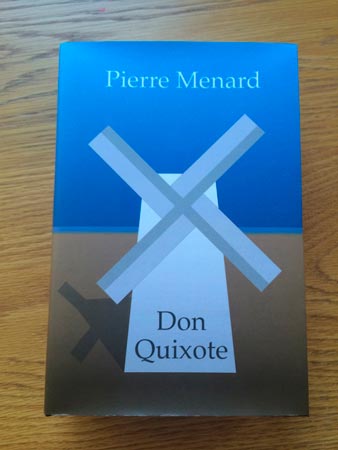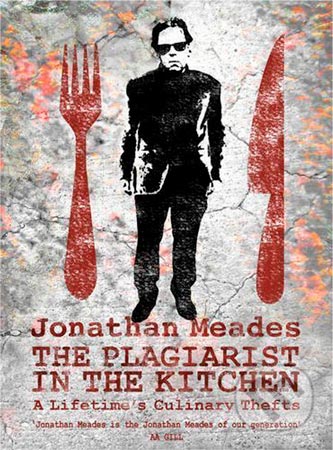A return, of sorts, to historical form: The Plagiarist in the Kitchen by Jonathan Meades.
-by Anne Collopy
1. Worlds of confusion.
In 1939, Flann O’Brien published At Swim-Two-Birds. Nothing about it, he insisted, was new. All the characters, the competing and contradictory narratives, are stolen. According to Anne Clissman, by the end “it has presented some 36 different styles and 42 extracts.” (Hopper) Ironically, O’Brien’s mining of literary form and content created something original, a hallucinatory universe in which the characters render an author who created them incapacitated in their effort to wrest control of their destinies from him.

2. Theft most foul, both literary and culinary.
Among the sources O’Brien plundered are fragments from recipes. The practice was unique for a novel but nothing new in the field of cookery itself. The wholesale plagiarism of recipes characterized the cookbook industry throughout the sixteenth, seventeenth, eighteenth and nineteenth centuries. In 1811, for example, one hack capitalized on the fame of the London Tavern to create a bestseller purportedly written by its principal cook but in fact lifted wholesale from the work of others, principally women.
This year Jonathan Meades has followed suit with The Plagiarist in the Kitchen. And in common with O’Brien he appears to take an interest in questions of creation, agency and identity. In one of the epigrams interspersed with his recipes, Meades asks: “Was Pierre Menard a plagiarist? Yes. But he had a persuasive belief in the form of his creator J. L. Borges.” (Meades 27) The reference is to Pierre Menard: Author of the Quixote which, eerily enough, appeared the same year as At Swim-Two-Birds.
If not the tour de force that is Two-Birds, Menard has its metaphysically and metatextually comic moments. Its narrator has been convinced that in 1934 Menard wrote “the ninth and thirty-eighth chapters of Don Quixote and a fragment of chapter twenty-two” and attempts “as the primordial object” of the tale, in tortured syllogism, “to justify this ‘absurdity’” which, he maintains, is no such thing. Alas, no reference to recipes.

3. Cultural gymnastics.
Meades is something of a cultural dynamo. He uses the word metonymy, in a cookbook, includes declamations on art, music and film in The Plagiarist, likes Borges and mentions him elsewhere in the book along with other writers. Henry Green makes an appearance with his rendition, which seems to be cited by everyone these days, of what he found an old butler “most liked in the world.” It was:
“Lying in bed on a summer morning, with the window open, listening to the church bells, eating buttered toast with cunty fingers.” (quoted at Meades 165)
This reflection on things (among others) culinary appears incongruously across from a recipe for pineapple braised in beer but is welcome enough even so.
4. A brazen crook and critic?
In contrast to the subterfuge involving the nineteenth century London Art of Cookery, Meades has been brazen in broadcasting his ‘borrowing.’ “The very title,” he confides, “was lifted, without permission and with the gracelessness that infects Cooking World, from Julian Barnes’ The Pedant in the Kitchen (plenty more to rip off there).” (Meades n.p.)
Meades cultivates a stance as the quickest and meanest draw in the critical crowd, and is not averse to indulging in unfairness; indeed, unfairness appears part of his persona. A former restaurant critic himself, he sits in the same school of British slashers with the late A. A. Gill, with Jay Rayner and Stephen Poole. At celebrity chefs he fires a justifiable broadside:
“There is little that is more preposterously comic than one self-important, thick, entirely humourless celebrity chef suing another self-important, thick, entirely humourless celebrity chef for having plagiarized a recipe to which neither self-important, thick, entirely humourless celebrity chef holds the rights. Are there rights to recipes?” (Meades 16)
A borrower he also may be, but notwithstanding these traits is not above (or below, depending on your perspective) identifying his culinary heroes. Mastering the Art of French Cooking is “that magisterial and essential book;” there is the obligatory tribute to Elizabeth David but it is delivered with uncommon sense. Along with that of Jane Grigson, the greater (and more humane) talent, her work
“weathers fashion’s vicissitudes not because of its culinary utility but because of the quality of the prose, the ethnographic inquisitiveness and ultimately the pleasure that is to be derived from a lucid presence.” (Meades 125, 97)
He cites Montaigne and knows of Gouffe (so very few any longer do) who rivalled Escoffier back in the day.
5. ‘I am not a crook.’
Sometimes Meades slips. Is it necessary to call bottarga “poutargue,” or only showing off an obscure term? Equating the eucharist to cannibalism is not nearly so original as Meades assumes, and his rendition of labskaus sounds more like red flannel hash made with cucumber instead of onion. Boiling tomatoes with incisions in the skin, a consistent canard of cookbooks, does not make them easy to peel; get a red Oxo tomato peeler instead.
Despite his manifold crimes Nixon did not introduce the American crawfish to France. Hold on, this last Meades presents as farce, and provides him the opportunity to note that “there is little to choose between” the disgraced president and Napoleon, a notion alone worth the price of the book. (Meades 123)
6. Utilitarian philosophy.
Any actual blemishes are minor and do not detract from the utility of The Plagiarist. Its pages include a lot of insight.
About beef dripping, a fat unfound in the American kitchen, Meades could not be better: “Delicious on toast. A scouser’s madeleine. Good for chips and Yorkshire pudding and anything else that comes from north of the Trent.” South of it too. After all, as he reminds the reader at the foot of each page, “vegetarianism is curable.” (Meades 21)
“Basil,” he warns, “is a problem. There are countless varieties; certain are unpleasantly bitter, others almost effervescent on the tongue, some flavourless.” In an echo of Orwell he extols commercial crackers while also eviscerating the vogue for kitchen dilettantry:
“‘Homemade’ begs one question. Whose home? Have you ever actually seen people’s homes? Why should biscuits at home be better than those baked in a factory, a factory that specialises in biscuits? I’m thinking of Nairn’s Oatcakes, Rakuson’s Matzo Crackers and Carr’s Water Biscuits. We don’t seek treatment from amateur surgeons and Sunday dentists.” (Meades 29, 143)
In similar mode, Meades excoriates the militant chlorophylliac as
“self-congratulatory, boastfully responsible… eco-this, bio that, green and organic and friendly to the earth which, being inanimate, has no idea that dunces are cosying up to it. Nothing is sustainable. To claim otherwise is to deny entropy, to ignore dust’s inevitability and to hope for everlasting life--you won’t get it.” (Meades 155)
7. The sparest of sensibilities.
As the passages indicate, Meades’ informal prose, other than the occasional split infinitive, is good and so are his recipes. Part of the point may be arguable, but as he sensibly says in one of his epigrams: “Nothing needs a ‘twist.’ The wheel has already been invented. The best a cook can do is to improve on what’s there--that usually means stripping out redundant ingredients,” and, he might have added, procedures, which also is part of his practice. “It means going back to the very foundations, of starting from zero in order to reach a point that has been reached many times before.” (Meades 67)
That sensibility has the side effect of rendering most of his recipes accessible to nearly anyone with at least a fourth grade reading level, and that observation is meant as a compliment. Take ‘his’ recipe for chicken and onions. It requires only four ingredients and suggests two more; sliced onion, duck fat or olive oil, chicken legs, and stock along with the optional white wine and “few scraps of raw ham.” You brown the chicken in the fat but not the onions, which you do not even prep: “Do NOT sweat them. Trust me.” After trusting Meades (or Jean-Pierre Xiradakis) just dump everything in a pot and bake it for an hour. (Meades 70)

8. I am not really a crook either.
But how brazen has he been? Despite the bluster he hedges his bet. He describes his Parmesan biscuits as a “variation on Simon Hopkinson’s recipe” and includes a bibliography of some thirty-three sources, many of them mentioned in the text. He happily ascribes the chicken and onions to his “friend Jean-Pierre Xiradakis who serves it at La Tupina in Bordeaux, a restaurant that has been rightly praised as ‘paleolithic’. It is possibly the best restaurant in the world…. ” (Meades 70) If that sounds like a parody of the pretense Meades attacks, no matter; the sentiment seems genuine enough, regarding both chef and food.
Meades drops a lot of other names, but the preening does add to the fun. At a party in 1988 or 89, Jane Grigson asks whether he used cookbooks anymore. Because “there’s no point in trying to fool a bullshit detector,” he tells the truth. (Meades 33, 110, 81) Giles MacDonough tells him where to find balls (not for throwing or kicking but for cooking) in north London; he knows chefs in France from Lille to Marseilles and Pierre Koffmann, who cooked at La Tante Claire, also during the 80s, an age of hedonic excess.
The serial identifications are not, it transpires, inconsistent. “If,” Meades maintains, “I know where a recipe comes from I own up to it.” (Meades 37) He goes so far as to confess that he does not really follow through on the premise of his title:
“Were it a work of genuine plagiarism I would not have admitted it. I’d have covered my tracks--unlike the thief who returns to the scene of the crime. I’d have called it something different and altered recipes, using, for instance, mackerel instead of crème anglaise and substituting glace fruits for sweetbreads.” (Meades 153, 170, n.p.)
All this is playful enough but all of it is a little deflating. It is sillier than clever, and would have been refreshing of Meades to return to the buccaneering mania for recipe theft perpetrated down all those centuries. Then again, Meades appears unaware of the tradition in which he has pretended to participate.
If his conceit wears thin, the approach to cooking is sound and the irascibility worthy of Auberon Waugh. The Plagiarist is pleasant enough to undermine one of Meades’ otherwise insightful observations that “no one reads a cookbook cover to cover.” (Meades 93)
Notes:
-The citation to “Hopper” in the text refers to Keith Hopper, “No joy in slight here,” the New Statesman (August 2011)
-The answer to Meades’ question whether there are legal rights to recipes is both yes and no, but this is not the time or forum for that discussion.
-Full disclosure; Blake Perkins, an affiliate of britishfoodinamerica, is one of the contributors who helped finance the publication of The Plagiarist in the Kitchen. He does not regret his investment.

